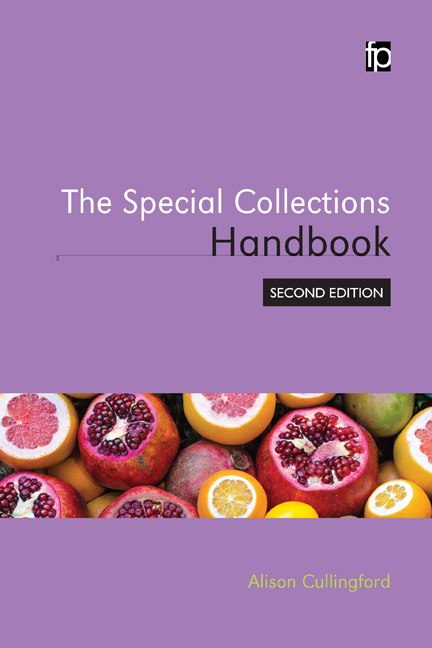Book contents
- Frontmatter
- Contents
- Preface and acknowledgements
- Introduction
- 1 The care of Special Collections
- 2 Emergency planning for Special Collections
- 3 Understanding objects in Special Collections
- 4 Acquiring and developing Special Collections
- 5 Cataloguing, description and metadata in Special Collections
- 6 Digitization and digital libraries in Special Collections
- 7 Legal and ethical issues in Special Collections
- 8 User services in Special Collections
- 9 Marketing and communications in Special Collections
- 10 Widening access to Special Collections
- 11 Organizational resources for Special Collections: space and people
- 12 Influencing and fund-raising for Special Collections
- Afterword: Special Collections futures
- Appendix A The Special Collections reference shelf
- Appendix B Skills for your Special Collections career
- Bibliography
- Index
Afterword: Special Collections futures
- Frontmatter
- Contents
- Preface and acknowledgements
- Introduction
- 1 The care of Special Collections
- 2 Emergency planning for Special Collections
- 3 Understanding objects in Special Collections
- 4 Acquiring and developing Special Collections
- 5 Cataloguing, description and metadata in Special Collections
- 6 Digitization and digital libraries in Special Collections
- 7 Legal and ethical issues in Special Collections
- 8 User services in Special Collections
- 9 Marketing and communications in Special Collections
- 10 Widening access to Special Collections
- 11 Organizational resources for Special Collections: space and people
- 12 Influencing and fund-raising for Special Collections
- Afterword: Special Collections futures
- Appendix A The Special Collections reference shelf
- Appendix B Skills for your Special Collections career
- Bibliography
- Index
Summary
These are indeed challenging times for Special Collections. Special Collections contain a wealth of wonderful materials and librarians who care about bringing those collections and people together. This is shown by the many examples of good practice in this book (and I could have included so many more). But services are often underfunded, undervalued, under threat, beset with hidden collections and other inherited problems. A ‘perfect storm’ of pressure on public sector and higher education resources and the perception that everything is or soon will be digitized means that Special Collections must defend their very existence.
However, there are also tremendous opportunities. I hope this book will help librarians to see the power of new technologies to make collections available in ways unimaginable before, to make connections, to share ideas and to show their value to their host organizations. In a world flattened and homogenized by digital technologies, there is a demand for the power of objects and fresh narratives that Special Collections can offer.
Moving beyond the next few years, what of the future for Special Collections? Are they, or the library, dying, as is often predicted, thanks to the digital age?
Many possible futures exist for Special Collections and their parent libraries, depending on developments in the ‘ecosystems’ of which they are part. The study of ‘scenarios’ can stimulate Special Collections librarians to reflect on likely developments and build strategies to shape and respond to these possibilities. See for example:
• Libraries of the Future: UK university libraries in 2050
• Staley and Malenfant (2010): trends affecting ACRL libraries in 2025
• Association of Research Libraries (2010b): looking to 2030.
Though these all focus on higher education, these developments will also affect Special Collections in other sectors.
The deciding factors, already noticeable now, will be:
Academia open or closed. Openness will encourage non-traditional learners, collaboration between expert hubs and sharing of digital resources, offering exciting possibilities for bringing Special Collections to the world. Closure will see universities protecting their intellectual property and market share by restricting access and sharing. Contrast Staley and Malenfant's ‘Archives on Demand’ and ‘Renaissance Redux’ and Futures ‘Walled Garden’, but note that in either case Special Collections has a role, for instance in the latter as sources of expertise and unique selling points.
- Type
- Chapter
- Information
- The Special Collections Handbook , pp. 267 - 270Publisher: FacetPrint publication year: 2016



